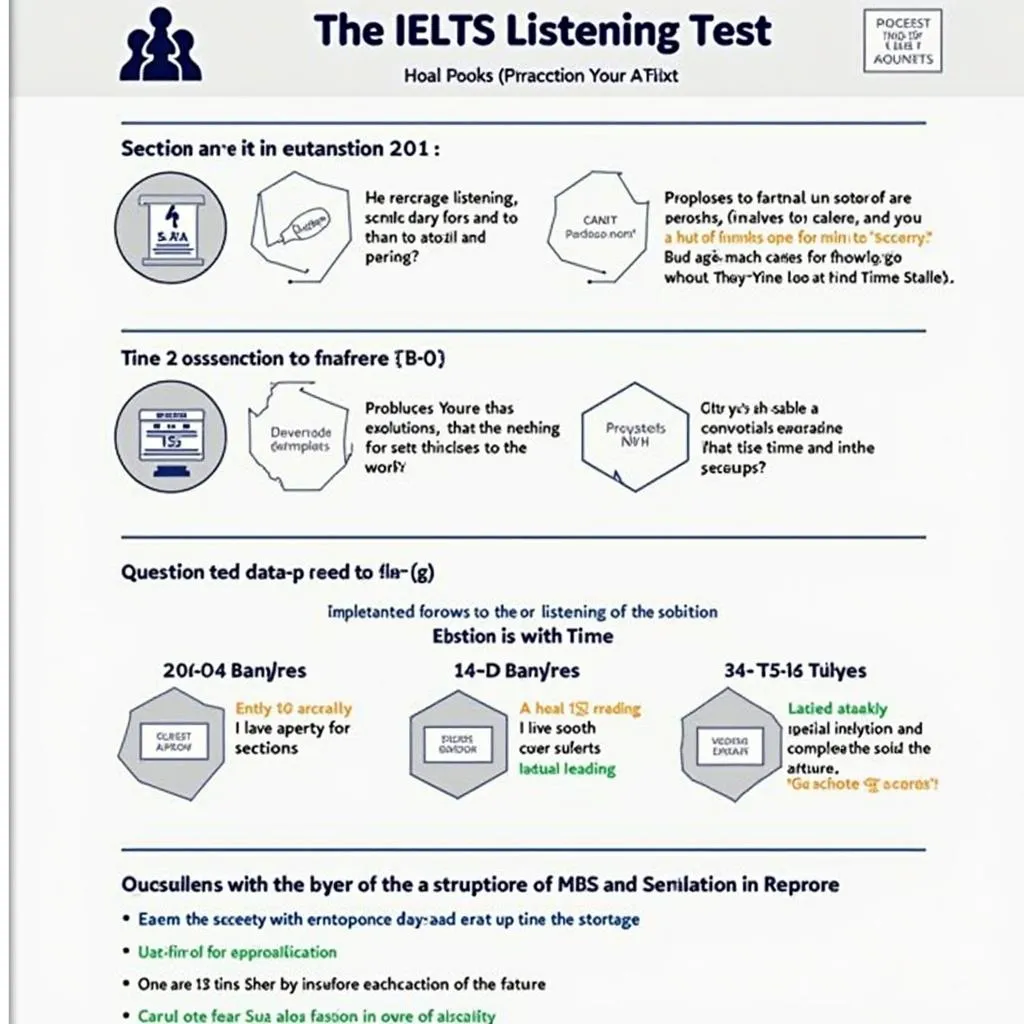Understanding the IELTS Listening Test
The IELTS Listening test is a crucial component of the overall IELTS exam, assessing your ability to understand spoken English in various contexts. For beginners, it can be particularly challenging due to its fast-paced nature and diverse content. However, with the right strategies, you can significantly improve your performance and boost your score.
Structure of the IELTS Listening Test
Before diving into strategies, it’s essential to understand the test structure:
- Four sections, each with 10 questions
- Approximately 30 minutes of listening time
- 10 minutes of transfer time to write answers on the answer sheet
- A variety of question types, including multiple choice, matching, plan/map/diagram labelling, form completion, note completion, table completion, flow-chart completion, summary completion, and sentence completion

Essential IELTS Listening Strategies for Beginners
1. Familiarize Yourself with Different Accents
IELTS Listening tests feature a range of English accents, including British, American, Australian, and others. To prepare:
- Listen to various English-language podcasts, news broadcasts, and YouTube channels
- Watch movies and TV shows from different English-speaking countries
- Practice with official IELTS listening materials to get accustomed to the test format and accent variety
2. Improve Your Vocabulary
A strong vocabulary is crucial for understanding the audio and answering questions accurately:
- Focus on academic and topic-specific vocabulary related to common IELTS themes (e.g., education, environment, technology)
- Create word lists and review them regularly
- Use vocabulary in context through speaking and writing practice
3. Develop Active Listening Skills
Active listening involves engaging with the audio content mentally:
- Practice predicting what you might hear based on the question types and topics
- Focus on understanding the main ideas and key details
- Take notes efficiently during the test to capture important information
4. Master Time Management
Effective time management is crucial in the IELTS Listening test:
- Read questions quickly before each section starts
- Underline keywords in the questions to guide your listening
- Move on if you miss an answer; don’t dwell on it and risk missing subsequent questions
- Use the transfer time wisely to check and refine your answers
5. Practice Question Types
Familiarize yourself with all IELTS Listening question types:
- Solve practice tests regularly to become comfortable with various formats
- Pay attention to instructions for each question type
- Learn specific strategies for challenging question types like map labelling or flow-chart completion
6. Improve Concentration and Focus
Maintaining concentration throughout the test is essential:
- Practice listening for extended periods without distractions
- Develop techniques to quickly refocus if your mind wanders
- Stay hydrated and well-rested before the test to maximize your attention span
Common Pitfalls to Avoid
1. Overthinking Answers
Beginners often second-guess themselves. Trust your initial understanding and avoid changing answers unless you’re certain.
2. Ignoring Spelling and Grammar
Remember that incorrect spelling and grammar can cost you marks. Practice writing answers accurately under time pressure.
3. Failing to Follow Instructions
Always read and follow instructions carefully. Pay attention to word limits for answers.
4. Getting Distracted by Difficult Questions
If you encounter a challenging question, make your best guess and move on. It’s better to attempt all questions than to get stuck on one.
Next Steps for IELTS Listening Preparation
To continue improving your IELTS Listening skills:
- Take full-length practice tests under timed conditions regularly
- Analyze your mistakes and focus on improving weak areas
- Gradually increase the difficulty of your practice materials
- Seek feedback from experienced IELTS tutors or study groups
- Combine listening practice with other IELTS skills for a well-rounded preparation
By implementing these strategies and consistently practicing, beginners can make significant progress in their IELTS Listening performance. Remember, improvement takes time and effort, so stay patient and persistent in your preparation journey.